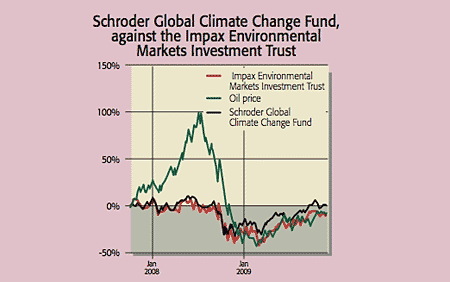Funds: How to convert green into gold
Investors have seen clean energy stocks plummet over the past few years. But that hasn't stopped money pouring into the sector, and some funds have prospered.

Get the latest financial news, insights and expert analysis from our award-winning MoneyWeek team, to help you understand what really matters when it comes to your finances.
You are now subscribed
Your newsletter sign-up was successful
Want to add more newsletters?

Twice daily
MoneyWeek
Get the latest financial news, insights and expert analysis from our award-winning MoneyWeek team, to help you understand what really matters when it comes to your finances.

Four times a week
Look After My Bills
Sign up to our free money-saving newsletter, filled with the latest news and expert advice to help you find the best tips and deals for managing your bills. Start saving today!
Climate change was on the agenda in Copenhagen this week as the city played host to the latest UN summit discussing ways to tackle it. But investors who have seen clean energy stocks drop 38% on average over the past four years must wonder, politics aside, whether there is really any money in green investing.
"Investors hoping to make a quick buck from clean energy will likely end up disappointed," says Justin Modray of candidmoney.com. "Clean energy investment performance is heavily influenced by the oil price in the shorter term. If the oil price is high, then clean energy is attractive, and vice versa if it's low." The current price is around $75 a barrel a far cry from last year's peak of $147.
So, many clean-energy stocks will not do well without another price spike. But that hasn't stopped money pouring into the sector. Last year, $155bn was invested in clean-energy firms and projects worldwide, a fourfold increase since 2004, according to a report by the UN Environment Programme. And the Obama administration has set aside almost $80bn from the US stimulus package to put into renewable energy and clean-technology incentives.
MoneyWeek
Subscribe to MoneyWeek today and get your first six magazine issues absolutely FREE

Sign up to Money Morning
Don't miss the latest investment and personal finances news, market analysis, plus money-saving tips with our free twice-daily newsletter
Don't miss the latest investment and personal finances news, market analysis, plus money-saving tips with our free twice-daily newsletter
Some funds have duly prospered. For example, the Schroders Global Climate Change Fund is up 35.1% over one year, and the Jupiter Green Investment Trust is up 14%. But there's a catch. With holdings such as Cranswick, the free-range and organic-sausage producer, the Jupiter fund is hardly a pure play on green technology. And with the likes of Cisco Systems and Honda among its top ten holdings, neither is the Schroders fund.
The Guinness Alternative Energy Fund (00 18 00 915 6566), however, does invest in alternative energy and energy-technology firms. Top holdings include Clipper Windpower and Trina Solar. But it offers quite a ride the fund sank 67% in 2008 before rising 34% over the past 12 months. For a less volatile play, there's the Impax Environmental Markets Trust (020-7434 1122), which invests in companies that provide more efficient and cleaner waste, water and energy services.

Top holdings include smart-meter stockist Itron, as well as geothermal provider Ormat Technologies and Clean Harbors, which provides hazardous-waste disposal. After a 33% drop in 2008, the fund is up 41% over one year and trades on an attractive 8% discount-to-net asset value. For a cheaper tracker, try the Powershares Global Clean Energy ETF (NYSE: PBD). It is up 7% since March, but down 14% from its 2007 high.
With politicians and a wall of cash behind it, clean investing offers great long-term prospects, but "investors should be prepared to sit tight for at least ten years and weather a few storms along the way", says Modray.
Get the latest financial news, insights and expert analysis from our award-winning MoneyWeek team, to help you understand what really matters when it comes to your finances.
Jody studied at the University of Limerick and was a senior writer for MoneyWeek. Jody is experienced in interviewing, for example digging into the lives of an ex-M15 agent and quirky business owners who have made millions. Jody’s other areas of expertise include advice on funds, stocks and house prices.
-
 Should you buy an active ETF?
Should you buy an active ETF?ETFs are often mischaracterised as passive products, but they can be a convenient way to add active management to your portfolio
-
 Power up your pension before 5 April – easy ways to save before the tax year end
Power up your pension before 5 April – easy ways to save before the tax year endWith the end of the tax year looming, pension savers currently have a window to review and maximise what’s going into their retirement funds – we look at how
